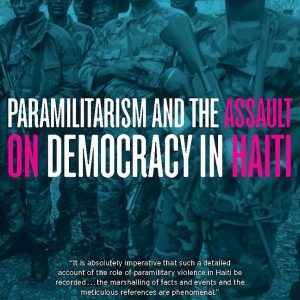Jeb Sprague is the author of Paramilitarism and the Assault on Democracy in Haiti from Monthly Review Press. This Op-Ed appeared in the Pambazuka News, 2013-08-07, Issue 642.
FEATURES
Island of Hispaniola: Coalitions and cross-border solidarity
Jeb Sprague
Unity of the left is necessary in Hispaniola if any meaningful change is to happen to the nature of the island’s highly unequal socio-economic and corrupt political systems. The conditions for social change are ripe
Political dysfunction on the Island of Hispaniola is rife, mired in clientelist networks (as in the Dominican Republic) and the blatant manipulation of elections (as in Haiti). Whereas the populations are interlocked in many ways, historical divisions remain and are readily exploited by dominant national and transnational groups. Most notable are the racist and xenophobic tendencies aimed at the Haitian migrant underclass, which is so clearly present in Dominican society. This serves to pit poor people against one another based upon arbitrary national boundaries, racial myths and historical rivalries in an island smaller than the U.S. state of Maine.
What are the prospects for the left and popular grassroots movements in Hispaniola under such conditions? With the successes in recent years of many leftist movements and governments in the region, what potentials exist and what is holding back the formation of similar political projects in Haiti and the Dominican Republic?
REPÚBLICA DOMINICANA
In mid-2012, press reports indicated that some on the left in the Dominican Republic were attempting to form an electoral coalition prior to the country’s recent elections, but this failed to materialize. The various left groups that remain and, importantly, the non-electoral social movements as well, have an opportunity to reenergize this process and carry it out on a deeper level, to form a coalition that is not only limited to electoral politics. This could include groups such as Alianza Pais, Max Puig’s Alianza por la Democracia, Frente amplio, Dominicano por el cambio, the country’s communists in the Fuerza de la Revolución, and the numerous grassroots movements, non-co-opted labour, university groups and the grouping of non-electoral leftwing groups (that in recent years have called for a constitutional assembly). Most importantly, a true coalition of the left would need to embrace the Haitian migrant community. A left-popular class coalition could mobilize the excluded, even possibly gaining support from some in the middle class and diaspora. It remains to be seen if these groups (or at least a sizeable number of them) can coalesce, as longtime divisions and rivalries persist. Many also differ in their agenda towards Haiti, and some on the Dominican left shamefully failed to denounce the 2004 coup in Haiti.
The mainstream Dominican party with populist rhetoric, the PRD (Partido Revolucionario Dominicano), in its recent political campaign had painted slogans on electricity poles around the country – the catchy: “Llego Papa” (“Here comes Papa”, as Papa is the nickname of the perennial PRD candidate and former president, Hipólito Mejía). The PRD, and its more conservative nemesis, (the PLD, which currently holds the presidency) appear to have somewhat of a headlock on the political process (but nowhere near as secure as the Republicans and Democrats in the U.S.). Cracks in the two party edifices abound though; such as the widespread acknowledgment of the extreme corruption of both parties (as well as those small parties that always ride their coattails). The last PRD government in office, under Hipólito Mejía, (2001-2004), was so deceitful and moribund that for years it allowed rightwing paramilitaries to run violent raids into Haiti against the Lavalas government that was in power at the time. Mejía’s administration even took part in the illegal U.S. occupation of Iraq.
At present the PRD is plagued by an internecine power struggle, with its different factions verbally and occasionally physically assaulting one another. At first glance the situation appears rooted in a personal fight, a manifestation of a personality conflict between businessman Miguel Vargas Maldonado and the old veteran warhorse of Dominican politics, Mejía. The fight is over power, rather than over ideological reasons or concern for the welfare of the country, even as the population exhibits a high poverty rate of 44%, with 26% in extreme poverty, while 63% of workers are in the informal sector and 17% unemployed.
Meanwhile, the bathed in cash corporatist PLD (the Partido de la Liberación Dominicana), albeit more unified than the PRD, has been rocked by corruption scandals, some making their way into Dominican courts. A den of mafia bosses, former President Leonel Fernandez remains the boss of all the PLD bosses, the “capo di tutti cappi”. Fernandez backed numerous ultra rightwing policies during his most recent period in office (2004-2012), including the outlawing of abortion, the deepening of racist discrimination against Haitians, all the while further moving government policies in line with the needs of transnational corporations. The onetime third force of Dominican politics, the old quasi-fascist Balaguerist party, the Partido Reformista Social Cristiano (PRSC), has dwindled in numbers but continues to serve interests and actions that work against “the welfare of the nation”, selling itself to the highest bidder.
In this atmosphere a successful and energized popular leftwing and anti-corruption coalition has space to grow, and it could even gain in defections from those segments of the PRD who still honour the inspirational memory of deceased PRD leaders like José Francisco Peña Gómez (a far cry from the PRD’s current heads, Gómez, who died in 1998, spoke out against the 1991 coup in Haiti and in support of Sandinista Nicaragua in the 1980s)…

Comments are closed.